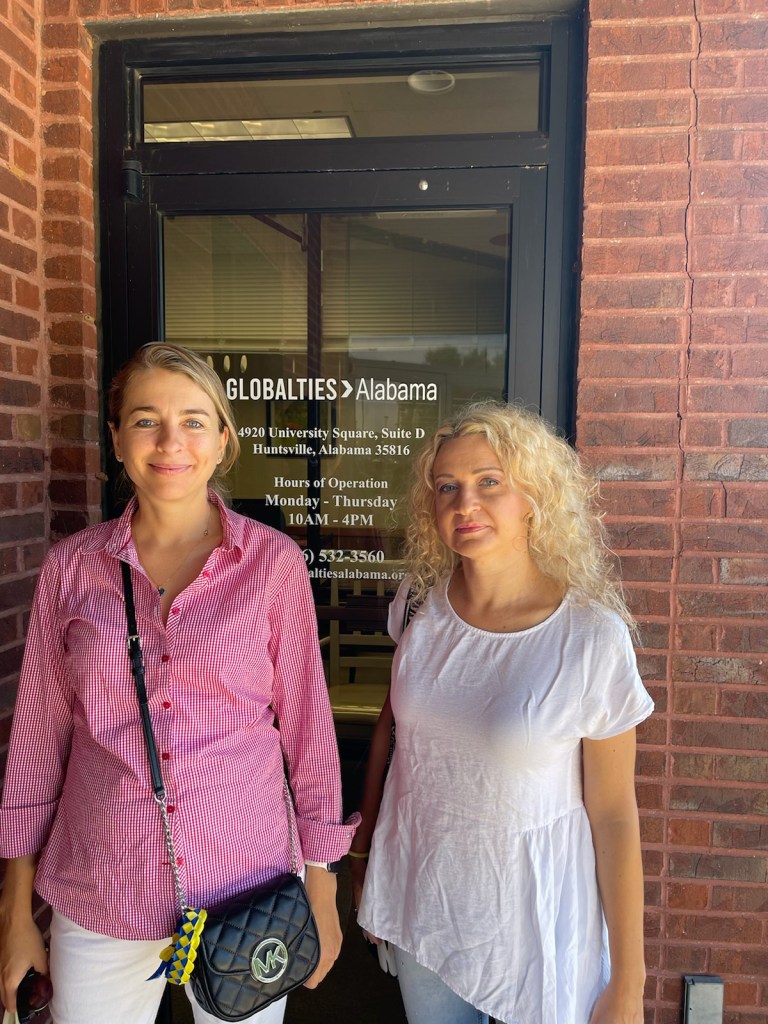‘There is no Europe without Ukraine’
Published 5:00 am Saturday, September 17, 2022

- Svitlana Chystiakova and Monika Chwasta visited Alabama through the Open World program from Poland where they work with Ukrainian refugees.
“Your life values change so much. Due to the situation, you just realize that what was a nice motto, ‘There is no tomorrow. Live your life today.’ becomes reality.”
Svitlana Chystiakova is originally from Ukraine and stayed in Limestone County while visiting other local governments in Alabama to talk about procedures and strategies for managing refugees. She works at a refugee aid center in Warsaw and has lived in Poland for many years now, but her family and friends were still in her home country when war began.
Despite recent victories by Ukraine to retake cities in the eastern area of Donbas, Russian President Vladimir Putin said on Friday his attack will continue. He also threatened more strikes on vital infrastructure if Ukraine were to target facilities in Russia.
Lost in translation of the back and forth conversations about war are the humans who are enduring the brunt of the tragedy. Civilians who have been trapped in their homes, only to be struck down by missiles, or worse, tortured. Friday, evidence of torture was found at one of the largest burial sites in Ukraine near Izium, a city recently recaptured from Russian forces.
Those who might still be alive are going through their own form of torture as they pray for an end to the fighting at their homes. Many of the women and children who have fled the country are now in new countries, learning new languages, trying to work, and somehow still moving on with life, all while people around them talk about the push and pull of Ukraine’s advances and Russian retaliation.
Recently, The News Courier spoke with two women who live in Poland and work with refugees there. Monika Chwasta works in Przemysl in City Hall and volunteers at the humanitarian aid center in the Polish city that shares a border with Ukraine. Svitlana Chystiakova is originally from Ukraine but has been living in Warsaw and is the general manager of a refugee aid center. Monika spoke only a few words of English, but Svitlana was able to translate.
They have seen the devastation in people’s faces as they cross the border to an unknown future. The women stayed in Limestone County while they visited cities in Alabama to learn more about refugee programs in the United States through the Open World program, which is an exchange program for international leaders that was created after the fall of the Soviet Union. Svitlana and Monika’s visit is the first time a group of Polish delegates was brought to the U.S.
Earlier this year Open World delegates from the U.S. went to visit Przemysl and saw the refugee center that had been organized on the border where Monika volunteers.
“The world should be really grateful to Ukraine that this war, at least at the moment, is stopped on this territory. But the price which this country paid, is really high,” Monika said. “That’s why it should be appreciated and supported by any sources from all over the world, in order to stop it and not let it spread to other countries.”
Svitlana’s parents were still in Ukraine when the war began. She says it took her a week to persuade them to come to Poland with her.
“It took them a while to find themselves in a, more or less, normal state of mind, if I can call it this,” she said.
She became emotional describing a time when in Poland she took her parents on a walk and, as a medical helicopter flew over them, her mother ducked and covered her head.
“I turned away because I don’t want her to see me crying. But it’s something you don’t want your parents to experience you know?” she said, holding back tears. “They are alive, and they are with me … But on the other hand, you leave your home. You think about it every day. Some people don’t have homes anymore.”
“It was really just a bad dream that came true one morning,” Svitlana said.
With a shaky voice, she described how after days of shock she and others started driving to the border to help refugees.
“You just see the lonely mothers with children who just have a plastic bag, and you put them in the car and you say ‘You are okay. You are safe now. We will help you.’”
Monika said that her house is so close to the border of Poland she can see Ukraine.
“We really would like to highlight it is really happening,” she said. “People are still coming, and war is still ongoing.”
“We are not going to any job. It’s not possible. You can’t concentrate on anything else. and as far as it will be such a need to help, we will help,” Svitlana said.
The women said people here in North Alabama can help simply by informing others that this is truly happening.
“After being informed, you make a decision to do something, and of course then the question is what you can do. But if you are not informed about the problem, you don’t even know that you need to solve it.”
The final thought they ended with: “There is no Europe without Ukraine.”





